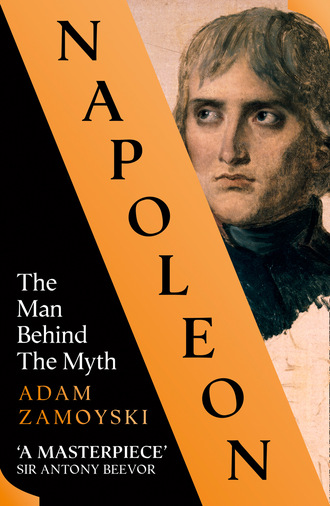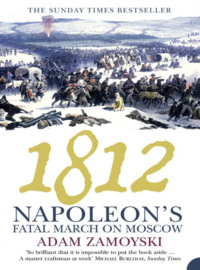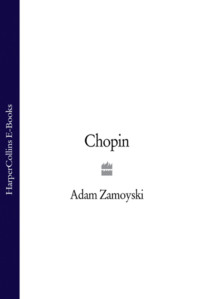
Полная версия
Napoleon
The General of the Corsican Nation was sixty-five and marked by twenty-one years of exile in London, during which he had grown to appreciate the merits of monarchy. Although it was the Revolution that gave him back his homeland, he was no revolutionary. On 8 September he opened a congress at Orezza which he packed with his family and supporters. Over the next three weeks this reorganised the administration of the island, giving him unlimited executive power, overall command of the National Guard and a considerable income. This was out of tune with what was being done in Paris, and many of the measures taken were against the law, given that Corsica was now a department of France.
Napoleone was not put off by such high-handed methods. Thanks to Paoli’s favour, Joseph had obtained a seat in the congress and the presidency of the district of Ajaccio. And although he did not benefit personally, Napoleone supported Paoli, accusing anyone who showed less than full commitment of being ‘bad citizens’, and suggesting to Carlo Andrea Pozzo di Borgo the physical removal of three officials whose zeal he found wanting. ‘The means are violent, possibly illegal, but indispensable,’ he insisted. He considered that Paoli was still placing too much trust in democracy and felt he should be more ruthless.8
Napoleone’s leave was running out, so at the end of October he sailed for France. His ship was twice driven back by gales, and it was not until the end of January 1791 that he would finally make it off the island. In the meantime, he remained politically active. On 6 January, along with Joseph, Lucien and Joseph Fesch he took part in the opening session of the Globbo Patriotico, the Patriotic Club of Ajaccio, affiliated to the extreme revolutionary Jacobin Club of Paris. Napoleone attended regularly, making frequent speeches. He was at his most fervent when it came to denouncing Buttafocco and Peretti, who had been agitating in Paris against Paoli. Napoleone wrote a pamphlet entitled Lettre à Buttafocco in which he denounced the deputy as a traitor and blamed him for all the blood spilt by the French in Corsica. He read the letter out in the club, where it was enthusiastically received, with a vote that a hundred copies be printed.9
When Napoleone did eventually sail for France, he took with him his younger brother Louis. The boy was twelve years old and unlikely to obtain an education if he were left in Ajaccio, and as there was no money to send him to a proper school, Napoleone decided to take this in hand himself.
On 12 February he was back with his regiment at Auxonne. He took two small rooms in the town, one for himself and one for Louis. ‘He is studying hard, learning to read and write French, and I am teaching him mathematics and geography,’ Napoleone wrote to Joseph on 24 April. ‘He will be a fine fellow. All the ladies here are in love with him. He has adopted a slightly French manner, correct and elegant; he goes into society, greets people with grace, makes the usual small talk with the gravity and dignity of a man of thirty. I have no doubt that he will be the best fellow of the four of us.’ He did not mention that young Louis sometimes required a thrashing to encourage him.10
On their journey from the south coast Napoleone had rejoiced in the revolutionary ardour he witnessed everywhere. Passing through Valence he attended a session of the local revolutionary club, and on 8 February in a letter to Joseph Fesch he assured him that the whole country was behind the Revolution, and that the only royalists he had met were women. ‘It is not surprising,’ he quipped. ‘Liberty is a woman more beautiful who eclipses them.’ This reflection seems to have prompted him to scribble some thoughts for an essay on the subject of love, which, he maintained, was an entirely superfluous emotion.11
He was welcomed at Auxonne by his friend des Mazis and his commanding officer du Teil, but many of his brother officers gave him a chilly reception when he began to voice his opinions. In its first stages, the Revolution had been welcomed by most educated Frenchmen, and certainly by young officers in provincial regiments, who resented the aristocracy’s monopoly over higher ranks. The abolition of noble rank itself in June 1790 removed all barriers to advancement, but it was not well received by all, and subsequent developments turned many against the way the Revolution was going. Napoleone’s revolutionary enthusiasm grated on them, and his obsession with Corsica would not have won him much sympathy.
He was busy seeing to the printing of his Lettre à Buttafocco, of which he sent copies to the National Assembly in Paris and to Paoli in Corsica. He was hoping to complete and publish his history of Corsica, and wrote to Paoli requesting access to his archive. Paoli was dismissive, describing the pamphlet as a pointless gesture, and not only failed to comply with Napoleone’s request for access to his papers, but let off the parting shot that history should not be written by young people, making it clear he considered him immature.12
In the process of reorganising the army, the National Assembly replaced the names of artillery regiments with numbers, and that of La Fère now became the First. Napoleone was transferred to the Fourth, formerly the regiment of Grenoble, now based at Valence, in which he was posted first lieutenant. He left Auxonne on 14 June and reached Valence two days later, moving into the same rooms he had occupied before and messing at the same inn. Madame du Colombier and her daughter had left the area, but many of the friends he had made during his previous sojourn were still there. Mademoiselle Lauberie de Saint-Germain, with whom he had flirted before, had in the meantime married Jean-Pierre Bachasson de Montalivet, an intelligent man whom Napoleone befriended.
Having settled in, Napoleone composed Dialogue sur l’amour, a Platonic discourse addressed to des Mazis, who was wont to fall in love and then extol the condition’s joys and sufferings to Napoleone. In it he admitted to having been in love himself, but argued that what was at bottom a simple sensation had been garlanded with too many ‘metaphysical definitions’. ‘I believe it to be harmful to society, to the individual happiness of mankind, and I believe that love does more harm than good,’ he argued, ‘and that it would be a blessing if some protective divinity were to rid us of it and deliver the world from it.’ It seemed absurd to him that men, ‘this sex which is master of the world through its strength, its industry, its mind and other faculties, should find its supreme felicity in languishing in the chains of a weak passion and under the sway of a being more feeble than itself in mind and body’. He might have jettisoned the sentimentality of La Nouvelle Héloïse, but Napoleone was still a child of Rousseau in believing that man’s first duty is to society and the state.13
The nature of the French state was being transformed, testing allegiances and polarising society. A few days after his arrival news reached Valence of the king’s attempt to flee the country and arrest at Varennes near the border with the Austrian Netherlands on the night of 21 June 1791. Back in October 1789 Louis XVI had been obliged by a mob of women to leave Versailles and move to Paris. He and his family effectively became prisoners in the royal palace of the Tuileries, and the increasing hostility of the Paris mob precipitated a decision to flee. This was seen as a betrayal, since his intention had been to join the anti-revolutionary forces gathering against France at Koblenz in Germany under his younger brother the comte d’Artois.
Napoleone had joined the Club des Amis de la Constitution, of which he soon became secretary, at whose meetings he made republican speeches. On 14 July, as his regiment paraded to celebrate the second anniversary of the fall of the Bastille, the officers and men swore a new oath of loyalty, to the National Assembly. A Te Deum was sung and at a banquet that evening Lieutenant Buonaparte was among those raising republican toasts. Not wishing to perjure themselves by taking an oath which overrode that pledging loyalty to the king, many of his brother officers resigned their commissions, and some would cross the frontier to join the royalist forces. Napoleone felt no such scruples. In his cherished narrative of a Corsica violated by the French, the monarch was the incarnation of the arch enemy, and since he had begun to develop a more positive attitude to France, the king drew the residue of his negative feelings.
Having to support both himself and Louis, Napoleone was short of money, and it was partly the prize of 1,200 francs (more than his annual pay) that induced him to enter a competition announced by the Académie of Lyon for an essay on the theme of ‘Which truths and which sentiments it is most necessary to inculcate in people in order to ensure their happiness’. In the event, neither he nor any of the other fifteen applicants won the prize, as the jury found their efforts wanting. One of its members described Napoleone’s essay as a wild dream, and another commented that ‘It may be the work of a man of some sensibility, but it is too poorly ordered, too disparate, too rambling and too badly written to hold the attention.’ It is indeed pompous, florid, full of cultural references and recherché words (he had made a list of them before starting), but it is nevertheless a fascinating document.14
It bristles with contradictions as Napoleone’s libertarian instincts jostle with an authoritarian urge to order things for the best. He prefaces it with some verses by Pope to the effect that man is born to enjoy life and be happy, and opens with the sentence: ‘At his birth, man acquires the right to that portion of the fruits of the earth which are necessary to his existence.’ He rages against those such as profiteers who stand in the way of this, and against authority in general. He stipulates that everyone should have their portion of land and the full protection of the law, and that people should be allowed to say and write what they like. Yet the law should direct people according to the rules of reason and logic, and protect them from ‘bad’ and ‘perverted’ ideas, which should not be permitted to circulate in word or in print. Intriguingly, he identifies ambition as the principal scourge of mankind, above all ‘the ambition which overthrows states and private fortunes, which feeds on blood and crime; the ambition which inspired Charles V, Philip II, Louis XIV’, which he sees as an ‘unruly passion, a violent and unthinking delirium’, since ‘Ambition is never satisfied, even at the pinnacle of greatness.’ Although he rejects Rousseau’s premise of man’s natural goodness in favour of a more cynical view of human nature, he indulges the noble savage myth and holds up Paoli as a paragon of virtue who had revived the spirit of Athens and Sparta.15
Having managed to obtain leave once more, Napoleone was back in Ajaccio by the beginning of October 1791. He canvassed for Joseph, who was seeking election to represent Corsica at the Legislative Assembly which was to meet in Paris (the National Assembly had dissolved itself). But Paoli placed his favoured candidates, and Joseph was rewarded with no more than a local post at Corte. Paoli showed ambivalence with regard to the Buonaparte clan, and particularly to Napoleone, who wore a French uniform and was beginning to behave more like a French Jacobin than a Corsican patriot.16
Although Paoli had sworn loyalty to the French nation before the National Assembly in Paris on 22 April 1790, he had regarded the French as the enemy for so long that it was difficult for him to trust them. As well as being a monarchist, he was a devout Catholic and a friend of the clergy, who had backed him and sheltered his partisans. The Revolution’s disestablishment of the Church and persecution of the clergy was as offensive to him as to most Corsicans.
Only a couple of weeks after Napoleone’s arrival, on 16 October, his great-uncle Luciano died. Hardly had he breathed his last than his nephews and nieces groped under his mattress and then ransacked the room in search of the money they assumed he had squirrelled away. It turned out there was little left, as Luciano had been obliged to dig into his savings to pay Carlo’s debts. But Joseph managed to persuade the administration (of which he was a member) to reimburse the money Carlo had invested in the Salines over the years. The funds were invested in a number of properties confiscated from the Church, the royal domain and the nobility which were being sold off as biens nationaux, ‘national assets’. It seems that in order to scotch rumours of malversation, the Buonaparte brothers put about the story that they had found a fortune under Luciano’s mattress.17
While Joseph grafted at Corte, Napoleone obtained a command in the National Guard of Ajaccio, which relieved him from having to report back to his regular unit. But a new law stipulated that officers below the rank of lieutenant colonel must leave the National Guard and rejoin their units. Determined to remain in Corsica, he decided to try for that rank. He would have to dispute it with two formidable candidates. One was Matteo Pozzo di Borgo, a member of the most powerful clan in Ajaccio and brother of Carlo Andrea, Paoli’s trusted collaborator and currently a deputy to the Legislative Assembly in Paris. The other, Giovanni Peraldi, an infantry captain, was equally well connected, and his brother Marius was the other Corsican deputy in Paris.
Napoleone spent most of February 1792 at Corte, ostensibly as guide and amanuensis to the visiting philosopher Constantin de Volney, but in fact probably trying to obtain Paoli’s favour. His behaviour was not calculated to engage it: he was hyperactive, attending political gatherings and holding discussions with people in the street, voicing extreme views and calling for action. He did not cut a convincing figure. Although he was now twenty-two he looked much younger, and people made jokes about his small stature. According to one source, when he challenged Peraldi to a duel, the other did not bother to turn up.18
As the elections to the colonelcies of the Ajaccio battalions approached, Napoleone was back at home canvassing. All comers were welcomed into the Buonaparte home to dine. Mattresses were laid out on the floor for supporters from the interior, who would be useful in swaying the national guards, most of whom were also from the country, and it was they who would elect the officers. The opposition also canvassed, but they had not taken into account the determination of the Buonaparte.
The election, set for 1 April, was to be presided over by three commissioners, who arrived in Ajaccio two days before. One, Grimaldi, was lodged with the Buonaparte; another, Quenza, stayed with Letizia’s Ramolino family; but the third, Murati, had accepted the hospitality of the Peraldi. On the eve of the election Napoleone sent one of his henchmen from Bocognano, a patriotic bandit who had fought with Paoli against the French, to the Peraldi house with his gang of cut-throats. They burst in while the household were at dinner and kidnapped the commissioner, bundling him off to the Buonaparte house, where his protests were countered by Napoleone with the assurance that he only wished to preserve his independence of judgement from the influence of the Peraldi.19
In the morning, the 500 or so national guards gathered to elect their officers. Pozzo di Borgo and Peraldi were shouted down, and in a travesty of procedure Giovanni Battista Quenza was elected commanding officer, with Napoleone as lieutenant colonel and second in command. The celebrations in the Buonaparte home that evening were accompanied by a military band.
The following day Colonel Maillard, commander of the French garrison of Ajaccio, inspected Napoleone’s volunteers, but the presence of the two forces in the town made for tension. Just as tense were relations between the generally conservative citizens, who saw in the French regulars a guarantee of stability, and the volunteers, most of them wild men from the hills. On the afternoon of 8 April a quarrel developed between some girls playing skittles on the Olmo, and as onlookers and passers-by took sides insults began to fly which had nothing to do with the original dispute. Shots were fired and Napoleone went out to restore order, but more people spilled out into the streets in a confused outburst of animosities. After one of his officers had been killed, Napoleone was obliged to retire to the safety of the former seminary, where his men were stationed. Quenza and he agreed that the insurgency justified retaliation, and they began shooting at any of the townsfolk who came within range. The fighting gradually turned into a chaotic brawl with guns as private scores were settled. Napoleone tried to exploit the crisis by requesting permission from Maillard to take refuge with his men in the citadel, which aroused the Frenchman’s suspicion, and the following day Maillard ordered the volunteers to withdraw from Ajaccio. Napoleone insisted they remain, and again attempted to gain admittance to the citadel – he even tried to subvert the soldiers by denouncing their colonel as an ‘aristo’.
Hearing of the disturbances, the authorities in Corte despatched commissioners to find out what was going on. Napoleone set off to meet them in order to tell the facts his way, and wrote up a version justifying himself. After a cursory examination of the circumstances, the commissioners had a number of citizens arrested and ordered Napoleone and his volunteers to leave Ajaccio. He duly led them off on 16 April, and intended to go to Corte himself to explain, but he could not expect a welcome there. Paoli’s verdict on the events at Ajaccio was that one could expect nothing less when ‘inexperienced little boys are placed in command of the national guards’. He had had enough of the Buonaparte. ‘The General returned here yesterday evening, he is badly disposed towards me; I saw him this morning, we had an argument, and all is over,’ Joseph wrote to his brother, urging him to go to Paris as soon as he could to justify himself before the government.20
6
France or Corsica
Napoleone had much explaining to do when he reached Paris two weeks later, at the end of May 1792. More than one damning report of his activities in Ajaccio had reached the capital, and he had been denounced in the Legislative Assembly by the Corsican deputies Carlo Maria Pozzo di Borgo and Marius Peraldi, no friends of the Buonaparte since the National Guard elections in which their brothers had been trounced. Peraldi had made up his mind that the family had ‘never, under whatever regime, had any merit other than spying, treachery, vice, impudence and prostitution’. Pozzo di Borgo was more amenable, and Napoleone managed to placate him.1
Napoleone also needed to placate the war ministry, since he had overstayed his leave and could be classed as a deserter. Fortunately for him, war had broken out against Austria barely a month before, and since the emigration of thousands of officers had left a shortage, the ministry was not about to deprive the army of a trained officer on account of a squabble between small-town Corsicans. Colonel Maillard’s denunciation was passed to the ministry of justice, and although this had received similar unfavourable reports from other quarters, the matter rested there.2
The day after his arrival in Paris, on 29 May, Napoleone unexpectedly met an old friend from Brienne, Fauvelet de Bourrienne. Bourrienne had not pursued a military career but had joined the diplomatic service, which took him to Vienna and Warsaw, and he was now at a loose end. The two young men teamed up, sharing what little money they had and thinking up ways of making some more. Napoleone also found friendship at the home of his mother’s childhood friend Panoria Permon, a beautiful woman of doubtful virtue who presided over what appears to have been something of a gaming house in which she received Corsicans and others.3
On 16 June he visited his sister Maria-Anna at Saint-Cyr. ‘She is tall, well-formed, has learned to sew, read, write, dress her hair, dance and also a few words of history,’ he reported to Joseph Fesch, but he was worried that she had lost touch with her roots and become ‘an aristocrat’, and feared that if she had known he was a supporter of the Revolution she would never have agreed to see him. But his own attitude to the Revolution was about to be tested.4
A couple of days later, on 20 June, he met up with Bourrienne for lunch at a restaurant in the rue Saint-Honoré. On coming out they saw a crowd of several thousand men and women armed with pikes, axes, swords, guns and sticks making for the Tuileries. They followed, and took up position on the terrace of the Tuileries gardens, from which they watched as the mob surged up to the palace, broke down the doors, overpowered the national guards on duty and swept inside. Napoleone could not hide his indignation, and when he saw the king submitting to don a red cap of liberty and appear at the window to drink the health of the people, he exploded. ‘Che coglione!’ he reportedly exclaimed, disgusted that nobody had prevented the rabble from storming the palace, and declared that if he had been the king things would have turned out differently. He kept returning to the subject, making pessimistic prognoses for the future. ‘When one sees all this close up one has to admit that the people are hardly worth the trouble we take to win their favour,’ he wrote to Lucien two weeks later, adding that the scenes he had witnessed made their scrape in Ajaccio look like child’s play.5
A week later, on 10 July, he was reintegrated into the artillery with the rank of captain, and awarded six months’ back-pay. Although he was ordered to rejoin his regiment, he was in two minds as to what course to take. He had put the finishing touches to his Lettres sur la Corse, which was now ready for the printer, but as he admitted to Joseph, the political context was unfavourable. He was beginning to think that his future might lie in France, and advised Joseph to get himself elected to the Legislative Assembly in Paris, as Corsica was becoming peripheral. At the same time, he urged him to encourage Lucien to remain close to Paoli. ‘It is more likely than ever that this will all end in our gaining independence,’ he wrote, suggesting they keep their options open.6
Lucien failed to get taken on as a secretary to Paoli. He was seventeen, exalted and rebellious. His spirit was, as he put it himself in a letter to Joseph, gripped by boundless ‘enthusiasm’; he had looked inside himself and was ‘developing’ his character in a ‘strongly pronounced way’. His soul had been set on fire by reading the immensely fashionable Edward Young’s poem Night Thoughts on Life, Death and Immortality, and he had been inspired to discover his identity through writing. He was composing a poem about Brutus, and his pen flew over the paper ‘with astonishing velocity’. ‘I correct little; I do not like rules which restrain genius and I do not observe any,’ he wrote. He had also embraced the most radical revolutionary ideals. He assured Joseph that he ‘felt the courage to kill tyrants’ and would rather die with a dagger in his hand than in a bed surrounded by priestly ‘farce’.7
Warned by his younger brother Louis that Lucien was about to take a step that ‘might well compromise the general interest of the family’, Napoleone wrote to him more than once, trying to restrain him. Lucien was having none of it. He resented Napoleone’s dominant influence, accusing him of having fallen for the courtly attractions of Paris, and expressed his resentment at being told what to do in an impassioned letter to Joseph on 24 June, couched in the obligatory revolutionary idiom. ‘He seems to me to be well suited to being a tyrant and I think that he would be one if he were a king, and that his name would be one of horror for posterity and for the sensitive patriot,’ he wrote, casting himself as a ‘pure’ revolutionary and Napoleone as one who had sold out. ‘I believe him capable of being a turncoat …’8
Napoleone was in fact switching allegiance. He had nourished a vision of himself as the champion of a noble persecuted nation and its heroic leader Paoli, demonising France, on which he heaped responsibility for every ill. But over the past couple of years he had acquainted himself with that downtrodden nation, and found it was less innocent than in his dreams. Its heroic leader turned out to be just as unprincipled and tyrannical as any other ruler – and had failed to accord Napoleone the recognition he felt to be his due. Meanwhile, the demonic France had been reborn as the torchbearer for everything he had come to believe in. Viewed from Paris, Corsica was beginning to look small and mean. On 7 August Napoleone wrote to Joseph that he had made up his mind to remain in France. In its present financial condition, the family would benefit from his rejoining his regiment: at least one member would be drawing a salary. There was a war on, and sooner or later he would get the chance to gain promotion. But only three days later something occurred which changed his mind.9







